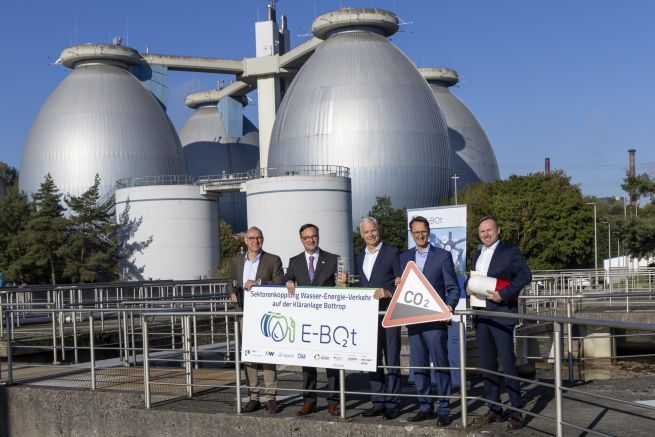Construction of a power-to-methanol demonstration plant
The aim of the current research project ” E-BO(2)T ” is to demonstrate the technology for the production of green methanol at the wastewater treatment plant in Bottrop. The building of a power-to-methanol (PtM) demonstration plant is in planning, which would cover the entire process of producing carbon-neutral methanol – beginning from the carbon capture process and electrolysis using surplus renewable energy till the synthesis of methanol from CO2 and hydrogen. Through the operation of the aforementioned demonstrator, the research consortium aims to prove that methanol production in wastewater treatment plants can be realized in a decentralized, economically viable and ecologically efficient manner and additionally that a new sector coupling between the energy, wastewater and transport sectors is possible. One of the main drivers for the effort is due the fact that green methanol readily finds application in some sectors as a replacement fuel in gasoline engines. It can also be used as a fuel for emergency power generators and as a parent chemical in the chemical industry.
First consortium meeting with handover of the grant notification by Parliamentary State Secretary Luksic to the Emschergenossenschaft at the wastewater treatment plant in the Welheim district. (from left to right): Dr. Wilfried Plum (Managing Director OWI RWTH Aachen), Oliver Luksic (Parliamentary State Secretary to the Federal Minister for Digital and Transport Affairs), Dr. Frank Obenaus (Director of Water Management and Technology at Emschergenossenschaft), Dr. Frank-Andreas Weber (FiW. e.V., Sector Coupling Water-Energy-Transport), Simon Pauli (Aspens GmbH).
Sewage treatment plants offer great synergy potential in terms of materials and energy as sites for methanol production. For instance, biogas combined heat and power (CHP) plants can produce renewable surplus electricity that can be further used for electrolysis of water. Wastewater treatment plants are also suitable locations for other renewable energy production plants whose electricity is suitable for PtM production. The pure oxygen produced in addition to hydrogen can also be used, for example, in the biological wastewater treatment of the sewage treatment plant. The biogas produced in the sewage treatment plant has a high CO2 content (between 30 to 50%), which is currently unused and therefore represents an ideal green CO2 source for methanol synthesis. Further potential synergies can be achieved through the dynamic heat balancing between the sewage treatment plant and the PtM plant, both of which produce and consume thermal energy. Through optimal system integration, the efficiencies of both the plants can be significantly increased.
Synergies in the production of green methanol
As of present, the quantity of methanol that can be produced in the demonstration plant suffices only for testing and trial purposes. It is therefore planned to develop scale-up and replication concepts for the plant during the construction and demonstration phase as a blueprint for numerous other wastewater treatment plants.
The project consortium consists of the following partners Emschergenossenschaft, the research institutes FiW (Forschungsinstitut für Wasserwirtschaft und Klimazukunft an der RWTH Aachen e. V.) and OWI Science for Fuels gGmbH as well as the electrolyzer manufacturer Aspens GmbH. In the project E-BO(2)T, OWI Science for Fuels is responsible for evaluating the potential uses of green methanol in fuel-related applications. This includes both the direct and indirect use of methanol derivatives such as methanol-to-gasoline. It also includes the determination of purity of methanol which is produced under varying operating conditions of the synthesis module, keeping also in mind that the produced methanol product has to undergo certification. As methanol has different physico-chemical properties on comparison to conventional fuels, OWI is also investigating the requirements for the existing infrastructure, storage, handling, safety aspects and environmental compatibility.
The “E-BO(2)T ” project is being funded by the Federal Ministry of Digital and Transport with a total of 12.45 million euros as part of the development of an umbrella development strategy for future use of renewable fuels. The Funding Initiative for the development of renewable fuels is coordinated by NOW GmbH and implemented by the project sponsors VDI/VDE Innovation + Technik GmbH and the Fachagentur Nachwachsende Rohstoffe e. V. (Agency for Renewable Resources).







